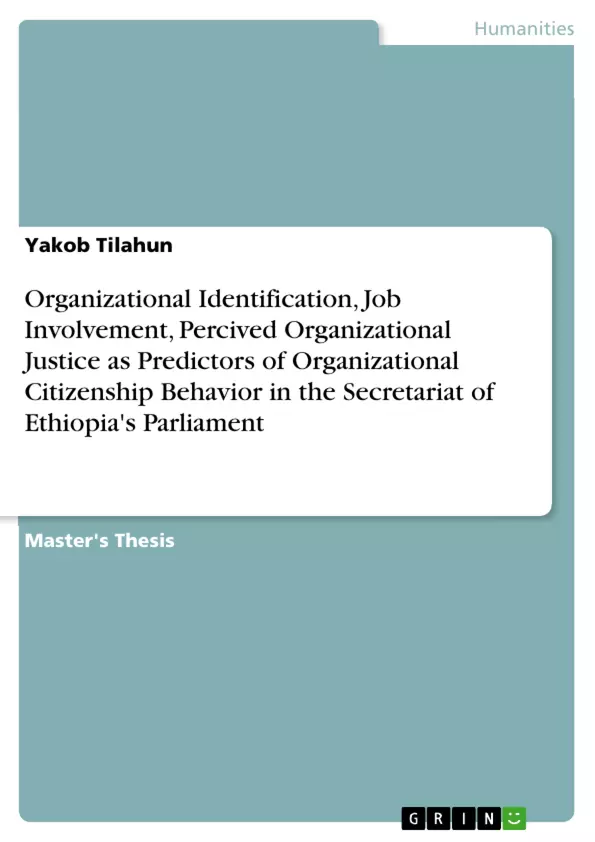Organizations are paramount places to observe human behavior. Principally, when it comes to organizational citizenship behavior, the ultimate understanding is residing inside work establishments. The present study was dedicated to discerning the interconnections between employees extra-role behaviors and factors behind the realization of these actions. Based on that, the due emphasis was given to see the prediction capability of socio-demographic characteristics of employees, Organizational identification, Job involvement, Organizational justice dimensions on employees OCB & its dimensions in the Secretariat of the Ethiopian Parliament, as it is one of the major government organizations. The study followed a quantitative approach with correlational design. The data were collected using standardized measurement scales by taking 202 (N=417) employees as participants through probability sampling assumptions. The collected data were analyzed using descriptive and inferential statistics corresponding Percentage, Mean, Man-Whitney & Wilcoxon tests, Pearson’s Product Moment Correlation, MANOVA, Regression Analysis as well as Canonical Correlation Analysis. Giving that, participants did not generally vary by their socio-demographic characteristics in displaying OCB, but with the exception of their Age groups and Educational status to show Altruism & Conscientiousness patterns respectively. Work experience was also relatively a good predictor of employees overall OCB level. Organizational identification of employees was significantly correlated with overall OCB and Altruism, Conscientiousness, Courtesy & Civic-virtue dimensions; Job involvement was also significantly correlated with OCB & all the five dimensions; from Organizational justice dimensions, distributive justice was not significantly correlated with overall OCB of employees but with Altruism &Conscientiousness dimensions, Procedural & Interactional justice were significantly associated with overall OCB & Altruism, Conscientiousness, Courtesy, and Civic- Virtue. Overall, the proportion of variance explained by independent variables was found to be significantly fit to predict OCB at a different level. From the case in point, organizations are expected to be considerate of their employees’ psychological cohesion, involvement and fairness insights to enhance extra-role behaviors and succeed.
Inhaltsverzeichnis (Table of Contents)
- Acknowledgements
- List of Abbreviations & Acronyms
- Abstract
- Chapter One
- Introduction
- 1.1 Background of the Study
- 1.2 Statement of the Problem
- 1.3 Objectives of the Study
- 1.4 Research Questions
- 1.5 Significance of the Study
- 1.6 Scope of the Study
- 1.7 Operational Definitions of Concepts
- Chapter Two
- Review of Related Literature
- 2.1 Introduction
- 2.2 Theoretical Foundations of Employees' Attitudinal and Behavioral Patterns in an Organization
- 2.3 Organizational Identification
- 2.3.1 Basic Conceptualizations
- 2.3.2 Organizational Identity and Identification
- 2.3.3 Major Components of Organizational Identification
- 2.3.4 The Relationship between Organizational Identification and Organizational Citizenship Behavior
- 2.4 Job Involvement
- 2.4.1 Basic Conceptualizations
- 2.4.2 The Relationship between Job Involvement and Organizational Citizenship Behavior
- 2.5 Perceived Organizational Justice
- 2.5.1 Basic Conceptualizations
- 2.5.2. Dimensions of Organizational Justice Perceptions
- 2.5.3 Distributive Justice
- 2.5.4 Procedural Justice
- 2.5.5 Interactional Justice
- 2.5.6 The Relationship between Organizational Justice and Organizational Citizenship Behavior
- 2.6 Organizational Citizenship Behavior
- 2.6.1 Basic Conceptualizations
- 2.6.2 Dimensions of OCB
- 2.6.3 Altruism
- 2.6.4 Conscientiousness
- 2.6.5 Sportsmanship
- 2.6.6 Courtesy
- 2.6.7 Civic virtue
- 2.6.8 Antecedents and Consequences of OCB
- 2.7 Conceptual Framework of the Study
- 2.8 Summary
- Chapter Three
- Methods
- 3.1 Introduction
- 3.2 Research Design
- 3.3 Study Area
- 3.4 Population and Sample
- 3.4.1 Sampling Procedures
- 3.5. Measurement and Instrumentation
- 3.5.1 Description of Variables
- 3.5.2 Instrumentation
- 3.5.3 Organizational Identification Scale
- 3.5.4 Job Involvement Scale
- 3.5.5 Organizational Justice Perception Dimensions Scale
- 3.5.6 Organizational Citizenship Behavior scale
- 3.5.7 Validity and Reliability Check to the Local Context
- 3.5.8 Validity
- 3.5.9 Reliability
- 3.6 Data Collection Procedures
- 3.7 Scoring of Instruments
- 3.8 Data Analysis
Zielsetzung und Themenschwerpunkte (Objectives and Key Themes)
This thesis examines the relationship between organizational identification, job involvement, and perceived organizational justice as predictors of organizational citizenship behavior (OCB) in the Secretariat of Ethiopia's Parliament. The research aims to investigate how these individual and organizational factors contribute to employees' willingness to engage in extra-role behaviors that benefit the organization.
- The impact of organizational identification on OCB
- The role of job involvement in predicting OCB
- The relationship between perceived organizational justice and OCB
- The combined influence of these factors on OCB in the context of the Secretariat of Ethiopia's Parliament
Zusammenfassung der Kapitel (Chapter Summaries)
- Chapter One: Introduction provides the background, problem statement, objectives, research questions, significance, scope, and operational definitions of the study. It sets the stage for understanding the research problem and its context.
- Chapter Two: Review of Related Literature presents a comprehensive review of theoretical foundations and empirical evidence related to organizational identification, job involvement, perceived organizational justice, and organizational citizenship behavior. It explores the existing literature and theories underpinning these concepts.
- Chapter Three: Methods details the research design, study area, population and sample, measurement and instrumentation, data collection procedures, and data analysis techniques. It provides a thorough explanation of the methodology employed in the study.
Schlüsselwörter (Keywords)
The research focuses on organizational identification, job involvement, perceived organizational justice, organizational citizenship behavior, and the Secretariat of Ethiopia's Parliament. The study investigates the influence of these factors on employee behavior and their impact on organizational effectiveness.
- Quote paper
- Yakob Tilahun (Author), 2019, Organizational Identification, Job Involvement, Percived Organizational Justice as Predictors of Organizational Citizenship Behavior in the Secretariat of Ethiopia's Parliament, Munich, GRIN Verlag, https://www.grin.com/document/456165



